|
|
|
Sort Order |
|
|
|
Items / Page
|
|
|
|
|
|
|
| Srl | Item |
| 1 |
ID:
108692
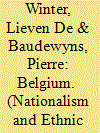

|
|
|
|
|
| Publication |
2009.
|
| Summary/Abstract |
Due to reversal of the center-periphery cleavage between Flemish and Francophones by the 1960s, the Belgian unitary state was transformed gradually into a fully fledged federal state. In spite of this empowerment of the regions and communities, the aftermath of the June 2007 general elections showed that Belgium was moving into a crucial, and maybe final, phase of its community conflict. Conflicts over socioeconomic autonomy have replaced the original language issues, essentially opposing on the one hand the Francophones in Wallonia and Brussels unanimously defending the institutional status quo of the current federal state, and on the other hand most Flemish political elites calling for radical autonomy, and some even for independence. In the near future, undoubtedly more policy competences will be devolved, but this "lighter but fitter Belgium" outcome may not satisfy Flemish elites.
|
|
|
|
|
|
|
|
|
|
|
|
|
|
|
|
| 2 |
ID:
108697
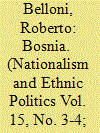

|
|
|
|
|
| Publication |
2009.
|
| Summary/Abstract |
The process of implementation of the Dayton Peace Agreement in Bosnia has come to a halt. Particularly since 2006, nationalist rhetoric has increased, political, economic, and social reforms have stalled, and some analysts warn that the country might be sliding towards collapse. This article traces the roots of the current crisis in the 2006 failed constitutional reform attempt, which has highlighted the precarious state of the Bosnian political situation and, more broadly, in the limited impact of the international community's illiberal, top-down strategies employed in the country since almost the beginning of the peace process. It concludes by suggesting the need for a new approach, led by the European Union, and aimed at reviving the domestic political process.
|
|
|
|
|
|
|
|
|
|
|
|
|
|
|
|
| 3 |
ID:
108691
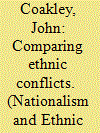

|
|
|
|
|
| Publication |
2009.
|
| Summary/Abstract |
Notwithstanding predictions over the past century and a half that minorities defined in ethnic, linguistic, or cultural terms would gradually reconcile themselves to coexistence in states dominated by metropolitan cultures, difficulties arising from the mobilization of minority communities continue to be pronounced at the beginning of the twenty-first century. This article provides an overview of the extent of ethnic division in modern states, describes characteristic patterns of ethnic mobilization and focuses on a smaller set of illustrative cases that reveal many of these patterns. In this, it defines the context for a set of case studies that follow: Belgium, Spain, Northern Ireland, Bosnia and Herzegovina, Cyprus, Lebanon, South Africa, and Sri Lanka.
|
|
|
|
|
|
|
|
|
|
|
|
|
|
|
|
| 4 |
ID:
108698
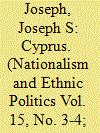

|
|
|
|
|
| Publication |
2009.
|
| Summary/Abstract |
This article provides an essential background to the domestic setting of the conflict in Cyprus and some of its international repercussions. In doing so, emphasis is placed on the geographical, historical, social, cultural, institutional, and political roots of the conflict. The presentation and analysis of these aspects aims at examining the relationship between political division along ethnic lines and the generation and internationalization of the conflict. It places some emphasis on the factors that contributed to the maintenance and reinforcement of ethnic cleavages in a bicommunal society and the failure of the political system to counteract divisive forces.
|
|
|
|
|
|
|
|
|
|
|
|
|
|
|
|
| 5 |
ID:
108703
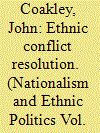

|
|
|
|
|
| Publication |
2009.
|
| Summary/Abstract |
This article generalizes on the basis of a set of case studies of ethnic conflicts that have followed different routes towards the goal of a long-term settlement: Belgium, Spain, Northern Ireland, Bosnia and Herzegovina, Cyprus, Lebanon, South Africa, and Sri Lanka. It begins by reviewing the significance of ethnicity in the modern state, exploring the political implications of different terminologies in this area. Having examined the patterns of political mobilization of ethnic groups (whether in the form of the party system or in the shape of military-type formations), it looks at the kinds of political outcome that have been associated with settlement processes. In addition to "solutions" that would be regarded as politically unacceptable, it identifies three common features which, depending on specific local circumstances, commonly occur: federal or other territorial arrangements, consociational government, and the political integration of minorities.
|
|
|
|
|
|
|
|
|
|
|
|
|
|
|
|
| 6 |
ID:
108700
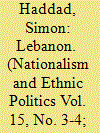

|
|
|
|
|
| Publication |
2009.
|
| Summary/Abstract |
This article seeks to interpret recent developments in Lebanon in the light of a well-known theory, consociationalism, which presents itself as a model for the government of deeply divided societies. It therefore begins by looking at the character of this particular approach to government, describing the main features of consociationalism. The next section explores the historical background to contemporary Lebanese politics, from the pre-independence period to the 2005 crisis. This is followed by a discussion of events since 2005, and of the changing dynamics of Lebanese politics. The last section seeks to interpret these events, returning to the question of consociationalism and questioning its relevance in understanding the Lebanese conflict.
|
|
|
|
|
|
|
|
|
|
|
|
|
|
|
|
| 7 |
ID:
108696
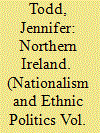

|
|
|
|
|
| Publication |
2009.
|
| Summary/Abstract |
The origins of the Northern Ireland conflict fall into three temporally distinct phases, each of which creates a particular sociostructural context that defines a set of protagonists with conflicting interests, more or less defined aims, and a given temporality of conflict. Each is superimposed on the previous phases, further defining and intensifying conflict. This multilevelled structure explains the difficulties of negotiating and of implementing an agreed settlement and allows assessment of the successes and failures of the 1998 settlement.
|
|
|
|
|
|
|
|
|
|
|
|
|
|
|
|
| 8 |
ID:
108701
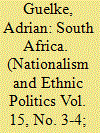

|
|
|
|
|
| Publication |
2009.
|
| Summary/Abstract |
The article revisits South Africa's unexpected transition to majority rule during the early 1990s. It underscores how surprising this development was by recalling the range of possibilities that appeared to exist at the time of apartheid's demise. The course of events that led to the African National Congress's achieving its objective of one person one vote in an undivided country is briefly explained, while the longer term trends that helped to make such an outcome possible are also identified. The manner in which the country has managed without the political devices commonly associated with the governance of deeply divided societies is analyzed.
|
|
|
|
|
|
|
|
|
|
|
|
|
|
|
|
| 9 |
ID:
108694


|
|
|
|
|
| Publication |
2009.
|
| Summary/Abstract |
The aim of this article is to look at the political implications of identity patterns in one case that is of exceptional interest, that of Spain. It begins by looking at the nature of identity, and the challenges it poses in the contemporary world. This is followed by a section examining the issue of collective identity in the Spanish context, exploring variation in forms of regional identity and relating this to new political structures in the regions. The two last sections look respectively at the manner in which the regional party systems reflect diverse patterns of identity and the challenges posed by these patterns for the system of government.
|
|
|
|
|
|
|
|
|
|
|
|
|
|
|
|
| 10 |
ID:
108702
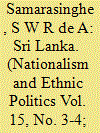

|
|
|
|
|
| Publication |
2009.
|
| Summary/Abstract |
Sri Lanka's ethnic war that lasted over 25 years produced a militarized country, political fragmentation, deep ethnic division, poor governance, and a weak economy. Reconciliation, peace building, and transformation of the politics and economy are essential for Sri Lanka to recover. However, prospects are not as good as they could be. Its major Western trading partners and donors are unhappy with the country's human rights record. The government is further strengthening the military. The current leadership is using the undemocratic institutions and practices of governance that the war created. Two-thirds of the people who have known little other than war, poor governance, and patronage politics may take a long time to realize their responsibility to pressure the rulers to mend their ways.
|
|
|
|
|
|
|
|
|
|
|
|
|
|
|
|
|
|
|
|
|